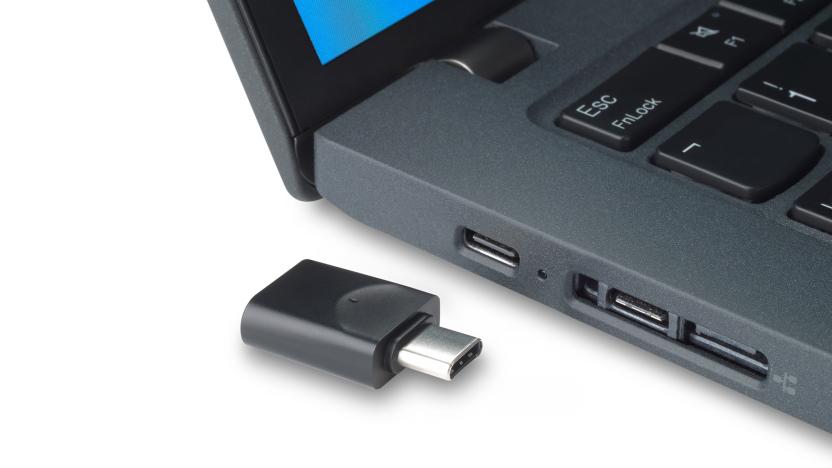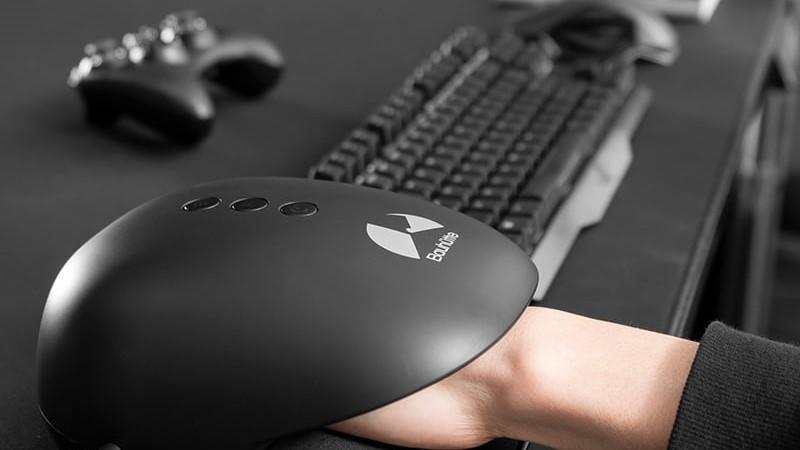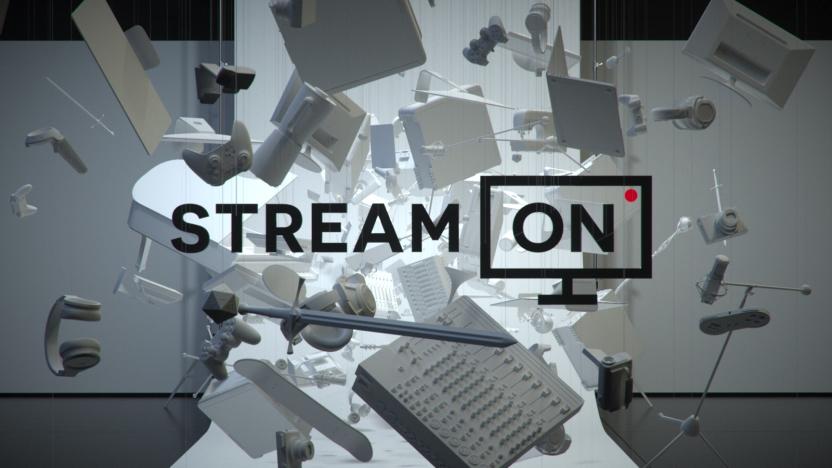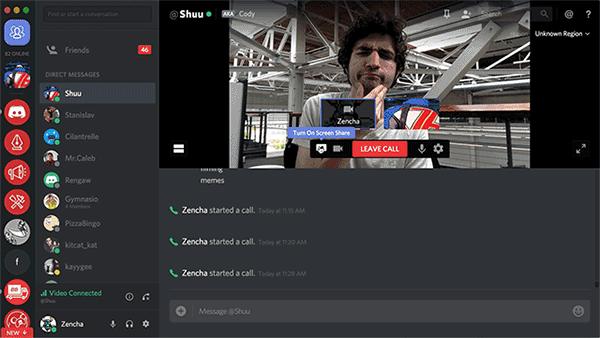gamers
Latest

Qualcomm’s new chip could reduce lag for connected audio devices
Qualcomm expanded its S3 Gen 2 Sound platform today with an eye on gamers. The new chip, designed for dongles and adapters, can deliver sub-20ms latency while supplying an additional backchannel for voice chat.

This is a shiatsu hand massager for gamers
A hand warmer setting may boost circulation and help you get good.

Logitech and Herman Miller team up to design ergonomic gaming furniture
Plenty of gaming chairs look cool, but whether or not they're actually good for your back is another question. Furniture company Herman Miller and Logitech's gaming hardware brand Logitech G want to change that. They're teaming up to create a line of ergonomic furniture for gamers, starting with a gaming chair that could arrive as soon as this spring.

Adidas signs Ninja to its first pro gamer deal
Popular gaming streamer Tyler Blevins, better known as Ninja, has secured yet another brand deal. And this one may be the biggest one of them all. Ninja has just revealed a partnership with Adidas, making him the first pro gamer ever to be signed by the brand. The German sportswear giant told Engadget that the deal with Ninja is intended to show its commitment to gaming culture and "supporting creators who show dedication to excelling in their field." Moving forward, Adidas said, it will continue to find new ways to support the 2.3 billion gamers across the world. The company added that, ultimately, it is here to help athletes make a difference in their game -- no matter what games they're playing.

Twitch’s live game show ‘Stream On’ premieres March 8th
Last December, Twitch announced that it would be making a live-streaming reality show, Stream On. In it, Twitch creators who need a boost to make streaming a full-time gig compete against one another in a series of challenges, Survivor-style, for a grand prize of $60,000, delivered across 12 months. Now the details are out, with the live game show set to debut with 14 competitors on March 8th at 3:00 pm PST.

Gaming chat app Discord tests video calls and screen sharing
Discord, the Slack-like gaming chat app, has been steadily improving since its initial launch a couple of years ago. Last January, it added a $5 paid tier for fans to essentially thank the company — the bonuses simply include GIF avatars, custom emoji and a bigger file upload limit. It secretly raised $50 million last month, as well. That extra cash may be why the Discord team is able to start rolling out two of its most-requested features, video chat and screen sharing.

ICYMI: Hitchhiking robot, 'Doom' within 'Doom' and more
#fivemin-widget-blogsmith-image-245360{display:none;} .cke_show_borders #fivemin-widget-blogsmith-image-245360, #postcontentcontainer #fivemin-widget-blogsmith-image-245360{width:570px;display:block;} try{document.getElementById("fivemin-widget-blogsmith-image-245360").style.display="none";}catch(e){} Today on In Case You Missed It: A kid exhibit in New York uses Kinects for an immersive environment experience. A robot is hitchhiking across the U.S. and wants strangers to take it to places like the Grand Canyon for the photo-ops. And game coders hacked up Doom to play another version of Doom inside it.

The Daily Grind: Do you read gaming-related novels?
No, not the novels posted in our comments. Actual novels. Literary and pulp fiction! Gamasutra recently ran an article chronicling an author's attempt to publish and market a book aimed squarely at gamers. The writer ran into difficulties, however, because of the publishing industry's insistence that "gamers don't read books." He got his book published, but when marketing fell to him, he couldn't convince gaming outlets to cover it, and even though reviews were positive, sales were poor. Major MMOs like The Elder Scrolls Online, World of Warcraft, Guild Wars 2, and Star Wars: The Old Republic all released lore-oriented novels, but my suspicion is that such books are made to sell games, not to sell books. What do you think -- do you actually buy and read gaming-related novels? Every morning, the Massively bloggers probe the minds of their readers with deep, thought-provoking questions about that most serious of topics: massively online gaming. We crave your opinions, so grab your caffeinated beverage of choice and chime in on today's Daily Grind!

Grade-school gamers test the foundation of DARPA's next training software
Inside the University of Washington's Center for Game Science (CGS), there's a department that is making video games for children, and it's funded mostly by DARPA. If you'll recall, the Defense Advanced Research Project Agency is the part of the US Department of Defense that looks into emerging tech and its potential use by the armed forces -- things like robots, for example. But in order to gauge software components, the educational titles developed at the CGS cultivate "adaptive learning" tech that could be employed for military training. With tools that foster school-age students' STEM skills, researchers can test a game's adaptive teaching abilities and potential for use in other learning scenarios. Developers examine how AI that changes to suit education level could be leveraged for real-world use, which moves beyond the DOD to include science and biochemistry queries. In fact, it was the CGS' game Foldit that crowdsources scientific research through protein puzzle solving that caught the attention of DARPA in the first place. You can have a look at that particular title on the other side of the break. [Photo credit: Mark Wilson/Getty Images]

Gamers and developers are giving up on second screen experiences
At E3 2012 and 2013, you couldn't go five minutes without hearing a game developer or executive pushing second screen experiences. Xbox SmartGlass, the PlayStation App, Battlefield 4 Commander, and even teasers for games like The Division were all about getting you to use your iPad or iPhone alongside the primary game experience on your TV. This year, things have changed. I didn't catch a single notable mention of second screen functionality from any of the major keynotes this time around. Not even Microsoft -- which was one of the biggest supporters of the idea -- bothered to devote time to it. There's a good reason for that: Nobody seems to give a hot damn about it anymore. That sentiment seems to be shared by gamers as well, and the app rankings illustrate that quite well: PlayStation App Xbox One SmartGlass But those are just the console apps, and nobody ever really expected those to be great, right? Surely a game like Battlefield 4 -- with a dedicated community of hardcore gamers and a ton of content updates throughout the year -- will fare better. Battlefield 4 Commander Nope. So what's the deal? Well it seems that gamers quite simply don't want a second screen experience. Sure, sending messages to one of my PlayStation friends from my iPad is neat, but it's certainly nothing groundbreaking. Even the Battlefield app -- which I actually really enjoyed, by the way -- just doesn't have the kind of addictive bite as basically any real iOS game on the top sellers chart. Luckily for the likes of Sony and Microsoft, they didn't really go all-in on second screen gaming, but the same can't be said for Nintendo. Determined not to support smart devices in any way, Nintendo just went ahead and included its own tablet with the Wii U console. That decision has put the Wii U in a race for relevancy as game developers abandon the second screen entirely and struggle to turn a profit with games published on Nintendo's console. So where does that leave iOS devotees? Luckily, the quality of App Store games has only ever gotten better and better, so don't fret over your unused console apps and boring second screen functionality, at this point it seems it was nothing more than a failed experiment that console gamers would now prefer to forget.

The Wolf Among Us hits snag on Mac, release delayed
The latest episodic adventure from Telltale Games, The Wolf Among Us, has been getting favorable reviews around the web, but Mac gamers haven't yet been able to sample the new title. According to a post on Telltale's community site, the Mac version has run into "an unforeseen issue," and will be delayed a "few days." The Wolf Among Us features an alternative take on classic fairy tales and children's stories including Snow White, The Three Little Pigs and Little Red Riding Hood. The game has been split up into five episodes which will be released individually over the course of several weeks. When the first episode is ready to roll on Mac, it will be available via Steam and the Telltale website. [via GameInformer]

Steam Greenlight adds non-gaming category for your consideration
Indie game makers have been lobbing titles over Gabe Newell's fence for a short while, but now his company is inviting everyone else to join in as well. Valve has widened Steam Greenlight's crowdsourced approval process to include non-gaming software, with the community voting the most popular and useful apps onto Steam's virtual shelves. We're thinking of submitting a program ourselves, that calculates the time required for three quantities of a decaying substance to fall to half their value, just so we can see everyone's faces when Half-Life Three appears on the list.

Nielsen says game consoles get men to use TV more: hurray, we think
We're not sure if we should always cheer figures that reflect sedentary behavior. Still, chalk one up for greater (if superficial) gender equality. Nielsen finds that, as of this past March, men who owned a modern game console like the PlayStation 3, Xbox 360 or Wii were using their TVs almost as much as women: while males in the broader population typically spend 37 fewer minutes in front of the big screen every day than females, that gap shrank to a negligible 11 minutes when console use came into play. Unfortunately, the agency doesn't say just what's getting men to tune in for that much longer. Gaming is the most likely culprit, but a raft of streaming video options could have some of those refined couch potatoes watching Hulu or Netflix instead of playing one more round of Gears of War. If consoles have people of all genders spending more time together, we're in favor of it; given that men still spend over twice as much time on consoles as women, though, it's clear there's still a bridge to cross if we want more of a balance in the kinds of TV activity we enjoy.

Turtle Beach Ear Force NLa and N11 stereo Wii U headsets hands-on (video)
Nintendo may be MIA at TGS this year (as usual), but that hasn't stopped Turtle Beach -- it brought a pair of Wii U headsets to the show anyway. We dropped by the outfit's booth to take a peek, finding seemingly empty boxes in lieu of product. Turns out they weren't so empty -- the Ear Force N11 and NLa headsets are so lightweight, we didn't even notice they were there. After a brief unboxing, this editor wrapped each set around his head, finding the headband tension of both the over-ear N11 and the on-ear NLa to be just as light as the accessories themselves, squeezing my skull with only the gentlest of pressure. The sets' earmuffs seemed built for comfort as well, soft, and not the least bit irritating. Staff on hand told us that the internals weren't quite final, but sound quality aside, we could easily see settling in with either of these products for a long, comfortable gaming session. Both sets arrive later this year -- $35 for the white, on-ear Ear Force NLa cans, and $50 for its black over-ear cousin. See our impressions for yourself in the video after the break.

Turtle Beach releasing entry-level Ear Force NLa, N11 stereo headsets for the Wii U faithful
Turtle Beach, the company that builds high-end audio gear for gamers immaterial of their bank balance is pushing out a pair of headsets for Nintendo's latest baby. The Ear Force NLa is an entry-level headset that's been customized to work with the Wii U GamePad, while the EarForce N11 is a little more serious -- with angled 50mm speakers with extended bass. Both units are also compatible with the company's DS and 3DS handhelds and will arrive in Q4 of this year, with the NLa setting you back $35 and the N11 a marginally heftier $50. Update: We've also heard that the NLa will be available in the UK in November, costing £40, while the N11 arrives in early 2013.

NPD: Number of US mobile gamers surpasses core, totals down
There are 211.5 million people playing games in the United States, a loss of 12 million players (5 percent) from 2011's numbers, the NPD reports. Not all of the gaming categories lost players, however: Mobile gamers rose 9 percentage points to take 22 percent, and digital gamers gained 4 percentage points to 16 percent. This makes mobile gamers the largest audience segment, surpassing core gamers, which held the top spot in 2011.The remaining categories – core, family and kid, light PC, and avid PC gamers – lost 17.4 million people this year. This is a "slight decline," the NPD says."Given the long lifecycles of the current consoles and the increasing installed base of smartphones and tablets, it's not surprising to see a slight decline in the core gamer segment," Anita Frazier, industry analyst for the NPD, says. "It's the revenue contribution of the core gamer segment that continues to outpace all other segments, and remains vital to the future of the industry."People buying games spent an average of $48 on physical copies and $16 on digital games from June to August. Core gamers spent the most on physical games, at $65. Almost 14 percent of all gamers purchased microtransactions or additional game content in the past three months, up from 11 percent in the same period in 2011; 27 percent of core gamers and 23 percent of digital gamers purchased in-game content.

Jason Citron picks up funding with new gaming company Phoenix Guild
Jason Citron was one of the iPhone's first big name developers. He and partner Danielle Cassley created a game called Aurora Feint way back in the early days of the App Store, and while that game didn't do as well as hoped, the duo and their backers eventually catapulted that title into its own social gaming platform called OpenFeint. That platform was later acquired by Japanese social network GREE, and Citron left the company that he originally founded last September. Now, Citron's back with a new venture, called Phoenix Guild. He's working on assembling a team that will, as he says, build "core games for gamers on post-PC devices." Citron's always been a fan of traditional gaming and "really rich, engaging games," and his new company, which was just funded to the tune of $1.1 million by venture capitalists (including his former OpenFeint supporters at YouWeb), is aiming to build those types of core, traditionally console style games for modern mobile devices like Apple's iOS devices and even Microsoft's upcoming Surface console. "It seems obvious to me," Citron says during a chat this week with TUAW, "that core gamers are moving from PCs to other devices and tablets," and Phoenix Guild's goal is to provide great core games on those new platforms. What exactly does Citron mean when he says "core games"? "Mass Effect, Call of Duty, and even Bastion," he says, rattling off a few popular and well-received console titles from the past few years. Citron agrees that you can't just "take what works on an Xbox and put it on an iPad," but he says there's a deeper experience that consoles currently provide that's not yet reflected on a lot of mobile games. Citron's also convinced that free-to-play is the way to go, but he's cautious of doing the model wrong. "You need to do free-to-play in a way that respects players," he says. "Not in a way that makes players feel nickle-and-dimed to death." Citron says on the traditional PC, games like League of Legends and Team Fortress 2 are examples of how to do microtransaction based games correctly, and he wants to bring that generous polish over to tablet-based games as well. Citron can't say anything about what Phoenix Guild's first game is like yet, but he says he's hiring AAA talent (including an artist from id games), and wants to put a solid, very social, very polished free-to-play game together (he even mentions the recent popular Magic: The Gathering iPad app as an example of the kind of game he wants to build, though he says that's not exactly what he's aiming for). So we'll have to wait to see exactly what Citron is building. But he does say that while OpenFeint was a nice success, what he really wants to do is "build a large successful gaming company," not another social gaming platform. OpenFeint came out of the ashes of Aurora Feint, which Citron admits didn't do as well as hoped "because it wasn't free, and because there was no free-to-play at the time." But this time around, while Citron is returning to the original game design ideas he started with, the goal is to aim for what Citron says Blizzard and Valve have built, big game companies founded on quality, classic releases. "I want to have a company like that," he says. It'll be a lot of work for sure, and as much as Citron is convinced there's a large hardcore audience ready to play games like that on mobile devices, he also agrees that it's so far "definitely unproven." And it's possible, he says, that he's wrong, and he's not able to make a company like this. Maybe he'll have to go the way of Aurora Feint, and turn the company he's growing into something else, a separate platform or some other important technology. But he hopes that doesn't happen. "If the universe will permit this sort of game company," Citron says with conviction, "I will build it."

NVIDIA outs GeForce GTX 670 GPU: it's Kepler without the mortgage
This'll be old news for some lucky folks, but NVIDIA has just unveiled the GeForce GTX 670 graphics card. It aims to bring Kepler to gamers who don't have off-shore bank accounts, with a price tag of $399 (or £329 in the UK, and €329 in Europe). What sacrifices will be made to reach that bracket, compared to the flagship GTX 680? A loss of 192 CUDA cores, for starters, plus a slightly slower 915MHz base clock speed, which will no doubt have an impact on benchmarks -- we'll do a review round-up shortly to figure out just how much. Nevertheless, you'll still get the same 28nm chip architecture and 2GB of DDR5 RAM, along with NVIDIA's GPU Boost technology that autonomously overclocks the processor to make use of available headroom. In terms of official performance claims, NVIDIA has chosen to compare its benchmarks to AMD's high-end Radeon HD 7950 and boasts that the GTX 670 comes out on top every time by a margin of 18 to 49 percent. Of course, the war of words is little more than performance art at this point, so stay tuned for independent tests. Meanwhile, gaming-friendly manufacturers like Origin and Maingear have declared that they'll carry the card alongside the 690 in its desktop offerings -- you can learn more about that after the jump.

Sony patent application aims to put names to faceless MMO players, organize real-world meetups
Dear MMO players, Sony's getting worried about your indoor tan. Really. The electronics giant's even gone so far as to file a patent application to get you out of your parent's basement and into the great outdoors. Alright, so the move isn't altogether altruistic -- it's more of a means to a promotional end -- but from the looks of this USPTO doc, the company's outlined a method to create a program that would encourage gamers to head into the daylight for organized events where everyone knows your online name. Of course, there'd be rewards and other incentives (trophies, perhaps?) on hand to coax you out of that Snuggie and help foster a sense of community. Not to worry, though, Bunim / Murray haven't got their MTV-friendly reality cams targeted on this concept, yet.

BioWare agrees Mac version of Star Wars: The Old Republic is important
Star Wars: The Old Republic is the new hotness in massively multiplayer games, and I'm really enjoying playing a smuggler on my PC. But unlike Blizzard, which makes World of Warcraft and has had a long policy of releasing both PC and Mac versions on the same disc, BioWare (who makes SW:TOR, as the kids call it) hasn't released a Mac version of its new video game. But there is hope. The two doctors who run BioWare tell our friends over at Massively/Joystiq that having a Mac version of the game at some point is indeed important. "We know there's a big Mac audience of BioWare fans ... we know that's an important and large audience. And we want to serve that audience," says Dr. Ray Muzyka. Unfortunately, he's not ready to serve that audience quite yet. You can play the game on a Windows-equipped partition, of course, but even though BioWare admits that's not the best way to do it, there are no official plans yet for a Mac port. That's too bad. Not only is SW:TOR a great game, but we've heard in the past that Mac audiences aren't just important for sales, they're also good for promotion. Mac users tend to be more influential (not to mention vocal) online, so if you can get Mac users playing and liking your game, you often can see a boost in overall player interest as well. Hopefully BioWare will get this game out for the Mac very soon, and (like World of Warcraft) in a form that makes some good evangelists out of Mac users.













